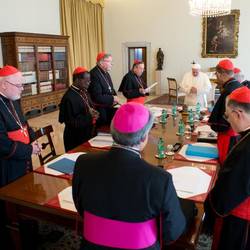Curia Reform: C9 Holds Meeting in View of the Consistory
By Andrea Tornielli
Pope Francis has invited cardinals from all over the world to attend the upcoming Consistory (Thursday to Friday) that will precede the new cardinal creations and will be dedicated to Curia reform. The cardinals were sent a preparatory document several days ago. The document was not the draft for a new Apostolic Constitution but a summary of the work carried out by the C9 – the Council that assists the Pope in the government of the universal Church – last year and the criteria it followed. The nine cardinals who met the Pope this morning, talked about how they would present the results of their work to their confreres during the Consistory. The proposals are already known. The details of these have already been presented to heads of Roman Curia dicasteries, who mostly approved them, despite the resistance understandably shown by those who it seems will definitely be affected by the mergers. The second step in Curia reform - after the structural reform already carried out, which involved the creation of the Secretariat for the Economy – is to reduce the number of Pontifical Councils by means of mergers, creating two big dicasteries: one will be dedicated to the laity and will be in charge of family and life related issues. The other will be dedicated to charity and justice and will merge together the Pontifical Councils for Justice and Peace, Cor Unum, Pastoral Care of Migrants and Itinerant People and Assistance to Healthcare Workers. Each of these big new bodies will be subdivided into secretariats and duties will remain the same though there will be fewer heads of dicasteries. It is possible therefore that the number of Curia cardinals will drop. In the future, the two new bodies will give more space to lay people and families, who will be able to hold positions of responsibility. It is still not clear whether the two new dicasteries will become congregations or remain Pontifical Councils. The current Apostolic Constitution regarding the Roman Curia, John Paul II’s “Pastor Bonus”, distinguishes between Congregations and Pontifical Councils because the former have the jurisdictional power to act on the Pope's behalf, while the latter do not. Nevertheless, the Constitution establishes that they have “equal dignity”. According to a number of canon law experts, on the basis of the jurisdiction criterion there would be no problem in turning the body for the laity into a Congregation, while matters addressed by the charity, justice and peace dicastery will deal with specific initiatives. Nevertheless, the latter dicastery looks to be quite large and will deal with important issues that are particularly pertinent today: justice, peace and migration. The C9 did not make any proposals regarding the reform of the current Vatican Congregations which shouldn’t undergo any changes. Some tasks may be transferred from one Congregation to another, as has already been the case in recent years. No decisions have been made regarding the Secretariat of State either. As is known and as has been announced, it will take another year before the reforms are enacted. And the implementation could take place in stages, as was the case with the creation of the Secretariat for the Economy.
|
.
Any original material on these pages is copyright © BishopAccountability.org 2004. Reproduce freely with attribution.
